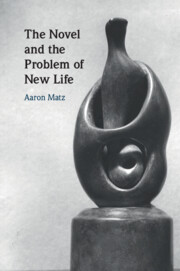Book contents
- The Novel and the Problem of New Life
- The Novel and the Problem of New Life
- Copyright page
- Dedication
- Epigraph
- Contents
- Preface
- Acknowledgments
- Chapter 1 Order and Origin
- Chapter 2 Revenge of the Unborn
- Chapter 3 Hardy and the Vanity of Procreation
- Chapter 4 Lawrence’s Storm of Fecundity
- Chapter 5 The Children of Others in Woolf
- Chapter 6 Reproduction and Dystopia
- Chapter 7 Lessing on Generations and Freedom
- Chapter 8 Procreating on Patmos
- Notes
- Works Cited
- Index
Chapter 3 - Hardy and the Vanity of Procreation
Published online by Cambridge University Press: 24 June 2021
- The Novel and the Problem of New Life
- The Novel and the Problem of New Life
- Copyright page
- Dedication
- Epigraph
- Contents
- Preface
- Acknowledgments
- Chapter 1 Order and Origin
- Chapter 2 Revenge of the Unborn
- Chapter 3 Hardy and the Vanity of Procreation
- Chapter 4 Lawrence’s Storm of Fecundity
- Chapter 5 The Children of Others in Woolf
- Chapter 6 Reproduction and Dystopia
- Chapter 7 Lessing on Generations and Freedom
- Chapter 8 Procreating on Patmos
- Notes
- Works Cited
- Index
Summary
Chapter 3, “Hardy and the Vanity of Procreation,” begins by noting that the notorious infanticide-suicide in Jude the Obscure has always posed a riddle for critics: laboring to make sense of it, they often treat it as an aberration in Thomas Hardy’s work. This chapter takes a different view. Father Time’s grotesque flourish is not simply a piece of Malthusianism, or an affront to the Victorian reader, but rather a kind of culmination of Hardy’s career-long struggle to integrate procreation, the fulfillment of creating new life, into his fiction and poetry. In Hardy’s novels reproduction is nearly always thwarted or suspended: this is consistent with his many expressions of distaste, throughout his verse and private writings, for the ongoingness of new life. Like Schopenhauer (whom he read), Hardy suggests that creating new persons is a kind of aesthetic-moral error. This chapter asks how the novel – a form of art usually considered dynamic, vital, and vibrant – can accommodate such a challenge to its very foundations.
- Type
- Chapter
- Information
- The Novel and the Problem of New Life , pp. 48 - 69Publisher: Cambridge University PressPrint publication year: 2021

